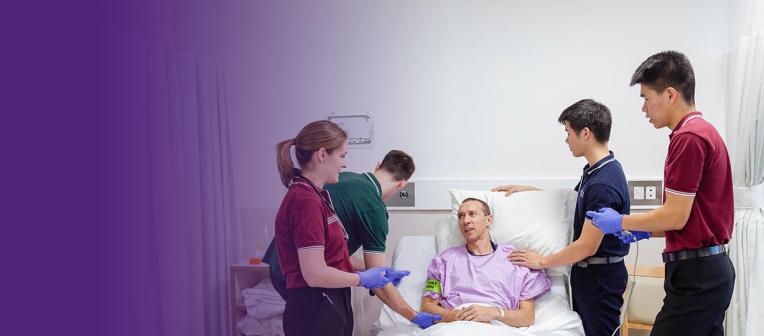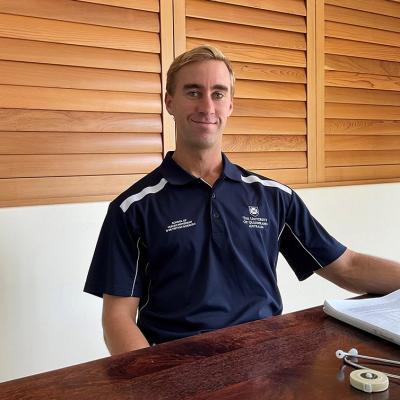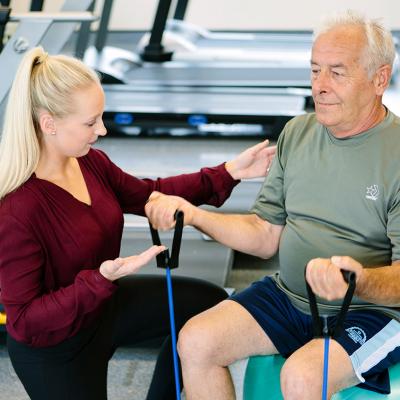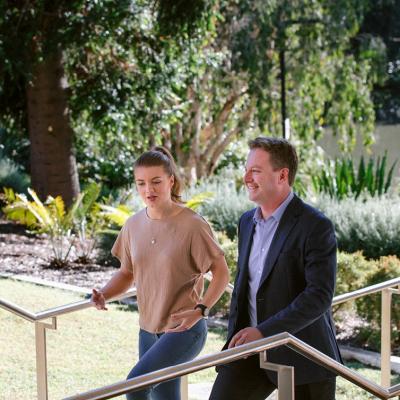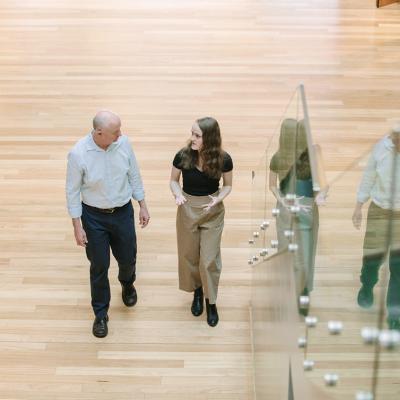Considering studying a Bachelor of Physiotherapy (Honours) at UQ? You may have lots of questions. We're here to help you find answers.
- Why study physiotherapy?
- Is physiotherapy a good degree?
- How hard is a physiotherapy degree?
- Is a physiotherapy degree worth it?
- What does a day in the life of a physiotherapy student look like?
- What type of person enjoys studying physiotherapy?
We've interviewed 2 UQ students to find out. Hussan is in his third year, while Annie is in her fourth and final year of a Bachelor of Physiotherapy (Honours). They’ve teamed up to answer some of your questions and share their experiences, to give you a better idea of what to expect from this degree.
Let's find out if physiotherapy sounds like the study area for you.
What drew you to studying physiotherapy?
Hussan: I loved the idea of studying in healthcare and making a positive impact on someone's health. At the same time, I loved dealing and interacting with people personally. Physiotherapy allowed me to combine that and ensure I can provide meaningful help to someone in a very much one-on-one way.
Annie: I wanted to pursue a career where I could play a large role in helping others. As I had an interest in anatomy, human movement and sciences as a student, physiotherapy sounded like a career that would keep me constantly on my toes learning new things every day.
I also had to see a physiotherapist a number of times myself to help me get back to what I loved, which therefore immediately sparked my interest in the field.
Why did you choose UQ to study physiotherapy?
Hussan: The simulated patient program really stood out for me at UQ. It’s as immersive as you can get but also has the safety of not harming any patients.
Annie: I grew up in and completed my schooling in Tasmania where there were no physiotherapy courses offered in the state at the time. After attending the UQ Open Day, I instantly fell in love with Brisbane, UQ and the warmer climate. After talking to current students at the time, I knew I would be well supported to achieve my best.
What type of person enjoys studying physiotherapy?
Hussan: There is no one type of person that is best fit to study physio. The people I've met come from all different walks of life! Some came from the army, some straight from high school, and some were a teacher for 30 years before physio. The type of person who should study physiotherapy is someone who wants to study physio.
Annie: Someone who enjoys helping others, working within a team, being hands-on, and loves a challenge.
What does a day in the life of a physiotherapy student look like?
Hussan: Studying physiotherapy means you always have something to do. Whether it be lectures, attending practical classes or observing patients, physiotherapy is a very immersive degree. That along with the fact that it is such a broad degree means that you always have things to learn.
Annie: Every day is different and ranges from watching lectures, practical hands-on classes, simulation classes, classes in the anatomy lab, and working alongside clinical educators and patients on placement in hospitals and clinics.
How hard is studying physiotherapy?
Hussan: Physiotherapy can be hard as it is such a broad field; some people may thrive learning about musculoskeletal topics while others find the hospital-based courses like cardio and neuro more their suit.
Annie: Physiotherapy is a challenging degree but favours those who are dedicated and willing to learn. It challenges your prioritisation skills, clinical decision making, and ability to communicate and collaborate with others.
What are the most challenging aspects of studying physiotherapy? How do you overcome these challenges/difficulties?
Hussan: Physiotherapy being such a broad field means that there is a lot of content to cover, especially if you consider that it needs to be done in the 3 years you are on campus learning all the theory.
The friends you gain along the way really help. It’s a very tight-knit community in physiotherapy, and everyone has the mentality to get through with each other – no man left behind kind of thing. There will always be people you can lean on here.
Annie: It can seem overwhelming at times, but a clear outline of classes and tasks to complete each week will ensure you set yourself up for success. Revision classes later in the semester are designed to revisit content and receive extra support on difficult concepts.
Have the challenges been worth it?
Hussan: The challenges have definitely been worth it. Physiotherapy does this special thing where it keeps pushing you to do better and they keep building you up. At the same time, you are with people that face the same challenges as you. When you look back on it all, you become really amazed at how far you've come and how much you've grown with the people around you.
Annie: Absolutely! I have had the pleasure of meeting some amazing fellow students, staff, educators, and patients. Being able to manage my own caseload on placement and make a real difference in the lives of others has been an extremely rewarding experience. I feel like the degree has really set me up for success with the foundations to take my degree in whichever direction I choose.
What do you love about studying physiotherapy?
Hussan: My absolute favourite thing about physiotherapy is the people. Physiotherapy is a special degree where you have a cohort with around 150 people. You are all doing the exact same subjects and having to grab each other all the time. It is safe to say that you end up getting very close with the people around you – you have to! The people here are special too, and I don’t think you can find more genuine teachers and peers anywhere.
Annie: I love that it combines theoretical and practical aspects of learning. I enjoy being able to learn the theory in a lecture, learn the hands-on skills in a practical class, then put it into practice on real and simulated patients.
How have you found studying in an interprofessional environment with students from different allied health disciplines?
Hussan: It is one of the best ways to get ready for how it really is! Realistically, it is not just you and the patient against the world. There are a whole team of people, including the patient, that all work together. There is no better way to get ready for that than by practising now.
Annie: It really helped me to gain a better understanding of the roles of different allied health professions. This aided me on clinical placement, as I was able to identify when other allied health professions should be referred. It has also been helpful when conducting joint sessions with other allied health professions such as speech pathology and occupational therapy.
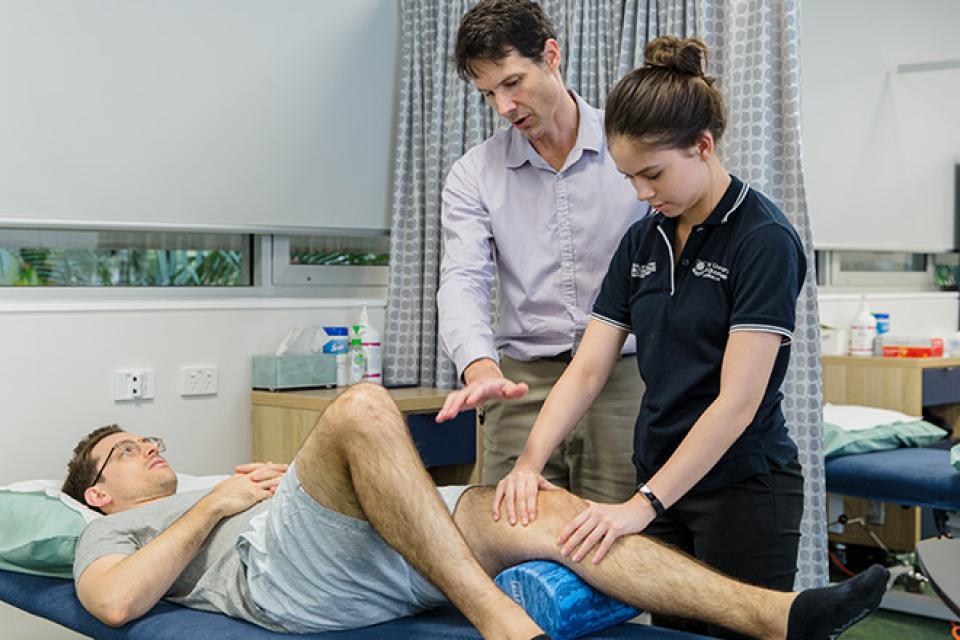
What are the most valuable skills you’ve learnt while studying physiotherapy?
Hussan: A lot of people focus on what you learn from physiotherapy, but I think what you gain from it is much more valuable. You learn how to talk to people, how to be empathetic and to have confidence in yourself. A lot of what is learnt in this degree is incredibly useful to becoming a physiotherapist (after all, that’s what it's for) but a lot can also be used to make you a much better person altogether.
Annie: Time management and prioritisation, communication, rapport building, compassion, and teamwork and leadership.
What type of career paths/specialisations are typical of physiotherapy graduates?
Hussan: You can find physiotherapists anywhere, which is definitely something I didn’t know when I first started. A lot of people think of the physiotherapist as being the local place you go to when you hurt your elbow or your back, but there's a lot more to it than that.
Physiotherapists can help everyone. There are physiotherapists helping patients walk again after they've had a stroke. There are physiotherapists helping patients breathe again after they’ve had lung surgery. There are even physiotherapists to help women after birth and to help babies develop! Whether in a hospital or in a rural clinic, physiotherapists are always there.
Annie: Many new graduate physiotherapists pursue one of two pathways:
- Becoming a physiotherapist in a hospital and rotating through a number of different wards. This allows you to work closely with other allied health professionals and medical staff.
- Pursuing a career in private practices, working with a broad range of clients with musculoskeletal conditions and sporting teams.
What advice would you give to someone who wants to study physiotherapy?
Hussan: Keep an open mind. There are so many areas to physiotherapy and so many places to go that it can even become overwhelming at a certain point. Most people have their goals set on sports when they start physiotherapy, but it's amazing how much this changes after all you learn. My best advice would be to start volunteering or observing at any physiotherapy places you can to really get an idea of what this degree entails.
Annie: Keep an open mind about the career path you want to pursue. I began studying physiotherapy with the intention of following the path of sports physiotherapy. Since moving through the degree, I have found particular interests in certain areas of physiotherapy, such as cardiorespiratory and neurological rehabilitation, which I did not know existed until beginning the degree.
Do you have aspirations for where you want your career in physiotherapy to go?
Hussan: Personally, I like to keep an open mind. I try not to have too much of an opinion of where I want to go before trying it. That being said, I do have a very big soft spot for paediatrics and absolutely adore the field.
Annie: I wish to gain a new graduate physiotherapist position at a hospital in Brisbane. This will allow me to build on my skill set to care for a wide variety of patients with a variety of conditions. I hope in future I will be able to undertake further learning to potentially work in areas such as the emergency department.
When I have broadened my skill and knowledge set, I hope to become a clinical educator to be able to pass on knowledge to aspiring physiotherapists as others have done for me.
Explore the Bachelor of Physiotherapy (Honours) or discover what it's really like to study other programs at UQ.

